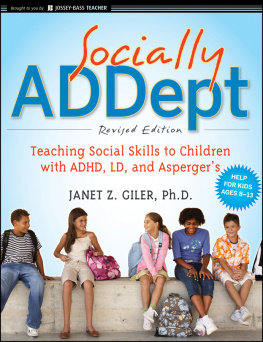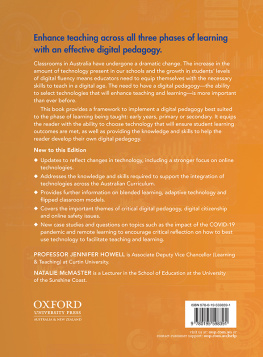Originally published by The Althouse Press
First published 2015 by Left Coast Press, Inc.
Published 2016 by Routledge
2 Park Square, Milton Park, Abingdon, Oxon OX14 4RN
711 Third Avenue, New York, NY 10017, USA
Routledge is an imprint of the Taylor & Francis Group, an informa business
Copyright 2002 Max van Manen.
All rights reserved. No part of this book may be reprinted or reproduced or utilised in any form or by any electronic, mechanical, or other means, now known or hereafter invented, including photocopying and recording, or in any information storage or retrieval system, without permission in writing from the publishers.
Notice:
Product or corporate names may be trademarks or registered trademarks, and are used only for identification and explanation without intent to infringe.
Library of Congress Cataloguing-in-Publication Data
available from the publisher
ISBN 978-1-62958-420-1 paperback
The Educator
At the end of a school day a teacher sees two boys stuffing pieces of wood in die outside door lock, perhaps so they can get into the school at night. The next morning the school principal confronts one of the boys, who refuses to give his friend's name. The angry administrator tells the boy that vandalism is a crime and that no child should get away with damaging public property and putting extra burdens on taxpayers. The boy is uncooperative and is suspended from school for five days.
What else does one do with a thirteen-year-old boy who refuses to be a "fink"? Let him off the hook? That seems unwise. But trying to show the value of private property and public good to a boy who is devoted to another principle altogether seems unproductive.
There is a prior pedagogical question to be answered: "What is the situation the child finds himself in?" Or, even more: "How does the child experience the situation?" No matter how well-meaning many of us are as educators, our words and actions may address themselves to a situation the child is not part of. A school administrator is not a manager, a policeman, a judge. He is first of all an educator. And so this administrator should wonder, "What is to become of this boy? How does this event fit into his life? What meaning does it have for him? What should I say, and how should I act to make sure he can learn from this experience? How can I allow this young person room for the youthful living that is appropriate for his age? How can I nurture him so he will grow up to be a responsible adult?"
Imagine the principal at work behind his desk. There is always something officious and solemn about that. A boy is sent in, stands and waits, and the administrator looks up briefly and says with the tone of the head of the school, "You are the one who tampered with the school door lock?" The boy, somewhat defiantly perhaps, nodsor is sullenly uncommunicative. The administrator returns to his work and the boy stands there. Time goes by. There are several minutes to reflect. What is it like to stand waiting like that? Would it be a positive or a negative experience for the boy? That depends in part on the kind of person the school principal is. Is he the God of the school? What is it like to stand waiting in front of a God?
Or would it be better for the administrator to say, "Look, I know you don't want to tell on your friend. But I can't let you off like that. After all, this is our school and..." It would depend on what "our school" meant for the boy, and why he wanted to break into it in the first place. A tactful administrator knows what to say and what not to say, what to mention and what to pass over or leave unsaid. The ability of a school principal to enter into the world of a child is thoughtfulness and tact.
The Psychologist
Danny is three hundred kilometres away from his home in a small northern mining town. The room of the clinic where they seat him on one side of the table is bright...and empty, except for a big box. The psychologist is a massive man, and when he enters he immediately sits down across from the boy. An assistant takes the mother and grandfather away to the other side of a one-way mirror. Danny is five years old. His development has seemed slow. Today he is about to undergo a series of diagnostic tests in this big city clinic.
The box on the table contains test materials, Danny doesn't know it, for the box is too high. Actually, he shows not the least bit of interest in the material the psychologist takes out of the box. The little boy looks very uncomfortable. He cries softly at first, and then begins to sob. It is clear he is not about to stop, so the psychologist returns the materials to the box. While the big man tells Danny there is no need for crying, he begins to write. At the same time he keeps an eye on the watch in front of him. Maybe Danny is inconsolable anyway, but the psychologist makes no attempt to comfort him. As he later explains, he does not want to interfere in Danny's reaction to the situation. He is merely making notes about the duration and intensity of Danny's crying.
A visiting psychologist is with the mother and grandfather on the other side of the looking glass. After almost ten minutes of tears, she can no longer bear Danny's distress. She enters the room and takes him on her lap. His sobbing stops and he calms down.
What is going on here? It could have been done differently. The psychologist could have taken the five-year-old by the hand and said, "Let's go in here and see if there are some toys for us." They might have walked into the room and explored it together. If it had been a child-friendly space, they could have looked at pictures on the wall and got to know one another. As soon as they were comfortable with each other, they could have turned their attention to the box. The psychologist could have made invitational suggestions that they should find out what might be in such an intriguing big box. Some toys, surely, for both of them. Maybe they could sit on the floor together and play.
Of course, it would have been even, better (maybe even vital) if some of the observations had been made at the child's home where the psychologist could "test" not only the child but also the living space, the family milieu, the everyday lifeworld of the child. Many tests can easily be done in natural settings with the child's own familiar objects and toys. Then, subsequent so-called "diagnostic" tests merely become interpretive means of finding out how to help the child have positive experiences in growing up.
What went on in that large, central clinic in that big city? That psychologist was steeped in child development literature, was well able to handle diagnostic instruments, could write precise scientific reports: a thorough clinician. He had diagnosed hundreds of children. Yet the psychologist seemed quite insensitive to the way Danny experienced the situation: the strange room, the big man with the box, mom and grandpa leaving him all alone. The essential first question was not asked: "How is the child experiencing this situation?" That professional had a good deal of clinical "knowledge" but lacked "thoughtfulness." Thoughtfulness is a special kind of knowledge.
The Parent
"I really would like to hear you practise the violin," says mother. A sour situation. What is supposed to be a satisfying experience, fun even, for parent arid child, becomes pure obligation. Already mother's voice bears a tone of anticipated disappointment. Every day another battle. And the parent hears herself think, "Why can this child not show some enthusiasm, some gratitude for all my sacrifice?"










